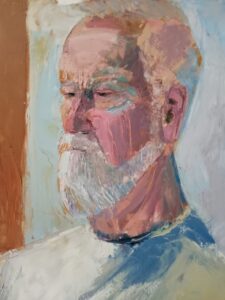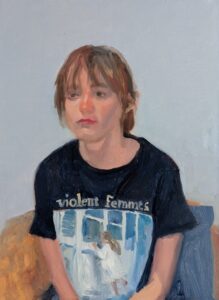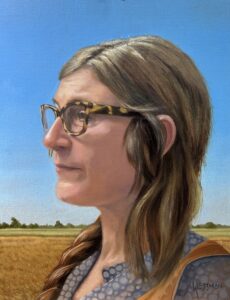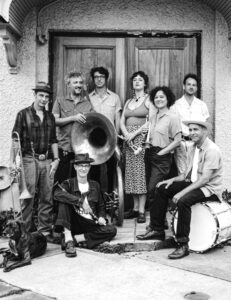The Beat Goes On With Jackie Beat by James Judd | Julia Thacker Brings Provincetown To Wildness by Juliet Leary | Faces of the Community by Abraham Storer | Photography Rooted in ‘a Sense of Place’ by Pat Kearns | A Play That Spans Generations by Kathi Scrizzi Driscoll | A New Orleans Street Band Takes the Stage by Dorothea Samaha
The Beat Goes On With Jackie Beat
It’s always a sad moment at the end of the season when most of the drag queens in town pack up their wigs and fly off to warmer shores. But the fun isn’t over yet: Jackie Beat is returning to Provincetown for three shows at Red Room this weekend.

“It’s just a legendary queen singing songs,” says Beat, describing her upcoming performances. “Some of them are new, some of them are classics. It’ll be entertaining.”
A seminal figure in the development of modern drag, Beat has had a rocky history with the tip of the Cape. A previous summer engagement in Provincetown a few years ago ended prematurely over a perceived lack of support from the venue where she was performing. Though she insists she’s over it, the memory lingers.
“Nobody cared,” she says. “Nobody was listening to me. I was where I was supposed to be when I was supposed to be there. One night, I just packed my bags. There was a saying in Provincetown: ‘Don’t Jackie Beat it out of town.’ ”
That edge of resilience has defined Beat’s career from the beginning. She grew up in Scottsdale, Ariz., moved to Los Angeles in the mid-1980s, and made her unplanned drag debut at the notorious West Hollywood gay venue Rage. “I was a serious poet,” says Beat. “I would do poetry open mic nights. One night, I was dressed up in full beatnik drag. I had written this funny beatnik poem. The poetry open mic venue wouldn’t even let me in the door. So, I went to Rage.”
The rest, as she describes it, happened by chance. The bar was hosting its own open mic contest, and she was asked for her name when she signed up. “I just blurted out ‘Jackie Beat.’ I read my poem, got a lot of laughs, and I also won the contest.”
That led to bigger stages. A stint in a long-running drag production of Valley of the Dolls got Beat to New York, where she found receptive audiences for her edgy brand of comedy. “The very first Christmas show I did was called Jesus Christ, It’s Your Birthday,” she says. “I did a photo shoot where I’m a blinged-out Mary with a cigarette hanging out of my mouth, holding the baby Jesus and rolling my eyes like I’m really over it. The Catholic League of America named me one of the top 10 anti-Catholics. It put me on the map.”
Jackie Beat’s “Boots the House Clown” runs at Red Room (258 Commercial St., Provincetown) nightly at 7 p.m. from Friday, Sept. 12 through Sunday, Sept. 14. Tickets are $41.50-$51.50 at redroom.club. —James Judd
Julia Thacker Brings Provincetown To Wildness

Pushcart Prize–winning fiction writer Julia Thacker’s debut poetry collection, To Wildness, conjures Appalachian memory, Midwestern grit, and New England landscapes with wit and reverence. It’s a book of bold shifts and radiant catalogues, populated by ghosts, bathwater, bag boys, angels, and kin tethered to oxygen tanks — voices that could have stepped out of Robert Lowell’s Life Studies yet are distinctly Thacker’s own. Moving between elegy, dreamlike vignette, and narrative, the poems carry the sense of a life lived across regions and registers.
The collection balances the surreal with the tactile. In “Dear Earth,” Thacker writes of her father’s decline with blunt tenderness: “Please excuse my father. He has an appointment to have his mouth stuffed with roses. His body will be shipped to Appalachia per his request.” In “For an Abandoned Library in Detroit,” decay takes root: “Inside rain-plastered pages of War and Peace, the Russian Empire has been bored by earthworms.” Elsewhere, grief buckles its seatbelt and rides shotgun: “I pull over, unbuckle you. Put a sack over your drowsy head, push, and yell Run.”
Thacker, who first came to Provincetown as a Fine Arts Work Center fellow, speaks of what it means to return with this book: “It feels wonderful to come full circle, to have kept my promise to myself and hold the book in my hand.”
Thacker will read from To Wildness at East End Books (389 Commercial St., Provincetown) on Friday, Sept. 12 from 5 to 6 p.m. The event is free. —Juliet Leary
Faces of the Community
The exhibition “Familiar Faces,” currently on view at The 204 cultural municipal building in Harwich, is a community affair. The show features portraits by 21 artists created during weekly portrait painting sessions hosted by artist Taylor Fox in his studio — also at The 204, a former elementary school turned arts center.

The works in the show convey the range of this artistic community, a mix of professional and amateur artists. Most are painters, but some work in drawing, pastel, and cross-stitching. The subjects convey a sense of community as well. Fox asks friends, acquaintances, and friends of friends to sit for the artists. As a result, the paintings capture a broad cross-section of the local population.
There are a number of notable Outer Cape personalities on view, including John Yingling, owner of Spiritus Pizza in Provincetown; local food enthusiast Nicole Cormier; and artist Pete Hocking. Robin Wessman’s cleanly rendered painting of Cormier recalls Grant Wood and the American regionalists with its agrarian background and clear, optimistic sky surrounding Cormier in profile. In his painting of Hocking, Wessman renders Hocking’s beard as a cascading waterfall.

It’s fun to move through the exhibition and track how different artists painted the same person. Brian Stern’s painting of Hocking is Fauvist-inflected with its bright oranges and purples. Rosalie Nadeau’s painting of Fred Boak, a WOMR DJ and vocalist with the Chandler Travis Philharmonic, is lush. Thick slashes of colorful paint convey Boak’s charisma and warmth. Across the room, Joseph Fish’s painting of Boak is created with thin, washy colors conveying a hazy impression.
George Booth’s painting of Provincetown artist Adam Peck and Tom Hoffmann’s painting of Sasha Fettig are standouts in the exhibition. Booth conveys a depth of melancholic feeling in his elongated portrait, a reminder that the best portraits convey more than just an outer likeness. Booth works viscerally with paint, digging into it with combs and a palette knife. Hoffman’s portrait of the youthful Fettig wearing a Violent Femmes T-shirt is expertly composed in blocks of cool, subtle color. Fettig’s shirt is like a painting within the painting. In this portrait, she sits with shoulders hunched and head thrust forward as if searching or yearning. It’s a beautiful painting not just of Fettig but of youth itself.

There will be an opening reception for the exhibition on Saturday, Sept. 13 from 2 to 5 p.m. The show is on view through Sept. 30 at The 204 (204 Sisson Road, Harwich.) See 204sisson.com. —Abraham Storer
Photography Rooted in ‘a Sense of Place’
The Provincetown Photographers Collective began just before the pandemic. “We had a group that was ready to meet at the Commons, but then Covid hit and we suspended it,” says Elizabeth Brooke, who brought the group together. When conditions eased, she revived the idea and invited fellow photographers to gather monthly and share their work. Now comprising 13 photographers, with members from Provincetown to Mashpee, the group has been meeting regularly for the past year and will present its inaugural show, “A Sense of Place,” at the Commons this month.

“It’s not a competitive group — we’re there to support each other,” Brooke says. Each month, a different member hosts the group meeting and sets the agenda. Topics range from conversations about ideas and process to technical discussions on printing, shooting, and editing.
The exhibition reflects the variety of the members’ styles, from abstract photography to portraiture. Brooke’s own contribution is a photograph of a North Atlantic puffin taken from a boat off the coast of Maine. Capturing the bird required patience, she says, as both she and the water were in motion. “The light changes and the water changes — you have to wait for the right moment.”

Brooke began her career in the 1970s as a photographer for the Provincetown Advocate. With a darkroom in her apartment just a block from the newspaper office, she would develop her film at home and walk her prints over, earning $2 each. She has had work published in the Independent since 2022.
Other members of the collective include Julia Cumes of Brewster, the Arts Foundation of Cape Cod’s 2024 Artist of the Year. Cumes began in 2001 as an intern for the Cape Cod Times and has since built a career as a freelance and commercial photographer. She has five pieces in “A Sense of Place,” including an image of a woman harvesting wild oysters in Wellfleet.

Another member, Lisa Raczka of South Dennis, joined the collective unexpectedly. “I thought Elizabeth was doing a one-day thing, but she said, ‘Oh no — you’re going to make a commitment,’ ” Raczka recalls.
“I’m definitely a nature photographer, but sports photography is really my thing,” she continues. For this show, however, she focused on Cape themes, including a dramatic photograph of a lifeguard chair under a brilliantly starry sky.

“A Sense of Place” opens with a reception on Friday, Sept. 19 from 5 to 7 p.m. at the Commons (46 Bradford St., Provincetown). The show is on view until Sept. 28. See provincetowncommons.org. —Pat Kearns
A Play That Spans Generations
Alison Weller has long been drawn to stories rooted in Ireland’s people and history. The actress and teacher also admits there was a lighter reason she chose Trad as her first directing project at Cape Rep Theatre since the 1990s: “It’s rare that you get to work on a play where everybody is over 100 years old.”

Written in 2006 by Irish playwright Mark Doherty, Trad began as a radio play before moving to the stage. The comedy-drama follows 100-year-old Thomas (Macklin Devine) and his 130-year-old father, known simply as Da (Seton Brown). Together, the two set out on a quest to track down the son Thomas believes he fathered 70 years earlier, determined to keep their family line alive.
“The play is funny, poignant, and deals with universal themes like family, tradition, and legacy,” Weller says. “What drew me was the journey these ancient people are on — how to balance the absurdity of it while grounding it enough that audiences believe the story as it wends its way along.”
The production is staged in Cape Rep’s new Barn theater in an oval space surrounded by the audience. Weller says the setting allows for a more meandering, imaginative approach to the play. Though Devine and Brown are decades younger than their characters, makeup plays only a small role in their transformation: much of the illusion, she says, comes through the actors’ physical stances, expressions, and gestures, along with the audience’s willingness to embrace the play’s fairy tale quality.
The cast also includes Ian Hamilton, a Cape Rep regular and longtime drama teacher at Nauset Regional High School. He plays both a priest — who, according to Weller, “tells a bananas story about a farmer” — and a mysterious, wraith-like elderly woman in a cemetery. Fiddler Jonathan Ford provides live music for the show, eventually becoming entwined in the narrative in a way Weller prefers not to reveal.
Trad runs Wednesdays through Sundays, Sept. 17 through Oct. 12 (no performance Sept. 25) at Cape Rep’s Barn Theater (3299 Main St., Brewster). Tickets are $25 to $40 at caperep.org. —Kathi Scrizzi Driscoll
A New Orleans Street Band Takes the Stage
Tuba Skinny, an eight-piece jazz ensemble from New Orleans, began playing together in 2009 in the distinctive busking style of the city. The musicians would gather spontaneously on folding chairs outdoors in the French Quarter and a crowd would form around them, their music spilling onto the street.

Their sound is vintage, with a specialty in traditional jazz from the 1920s and ’30s. It’s music with a laid-back, easy groove and a classic swing. Despite their quintessential New Orleans style, none of the band members is from the city. The leader and cornetist, Shaye Cohn, who is the granddaughter of jazz saxophonist Al Cohn, is from Boston. Before she played the horn, she was a classical pianist. But jazz grabbed her, and she was hooked.
Tuba Skinny has released more than a dozen albums and performed all over the world. They will be at the Payomet Performing Arts Center (29 Old Dewline Road, North Truro) on Saturday, Sept. 13, at 7 p.m.
While Tuba Skinny is best known for interpreting traditional jazz tunes, it’s dipped into other styles, too, including jug band music, spirituals, country blues, string band music, ragtime, and New Orleans rhythm and blues. Despite its many members, the band plays with a seemingly effortless cohesiveness: the horns sing with relaxed voices, the clarinet contributes its signature easygoing cry, and the tuba moves the whole gang forward with deliberate ease.
Tickets are $35 to $55 plus fees at tickets.payomet.org. —Dorothea Samaha



